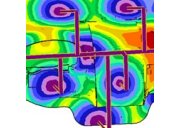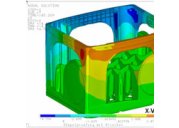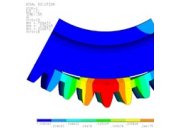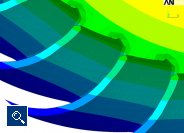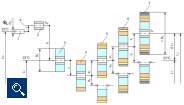Quality assurance
Secure the quality - recognise, evaluate and avoid risks
The quality of a product indicates to what extent a product fulfils the defined or existing requirements. Quality is therefore an area of strategic competitive potential and forms one of the triumvirates of goals of each product development process combined with costs and time. The simulation technology offers a number of options of recognizing weak areas and areas of optimization potential leading up to the production of the moulded parts. In this way improvements can be initiated and implemented prior to the tool being build. Today, the process simulation provides security hardly any product developer can afford not to have for the start of production of a component.
Precise knowledge of the influencing variables
The rheological, thermodynamic and morphological material properties are crucial for the quality of the components as well as their economic production to just the same extent as the component design involving the right plastics and manufacturing methods. In addition the design accuracy and the manufacturing tolerances (moulded part, tool, manufacturing machine) also determine the quality of the moulded parts. However, running optimized processes and efficient inspections also influence the component quality to a decisive extent. And only appropriate knowledge of the effects of the influencing variables and their corresponding parameters lead to high quality and precise components.
Process simulation - for rapid and trouble-free start of a production.
If the tool is simulated in advance the customer can rightly anticipate that the manufacturing process will start in a trouble-free manner and the tool will work as simulated. Therefore e.g. the injection points are laid down, the filling and holding pressure phases are simulated and the tool has been thermally designed. However, there remains one restriction up to today. The warpage quantity cannot be forecasted. However, to be as precise as possible we constantly test the various Simulation Programs in the simulation center in Rosenheim and very precisely know the individual systems' limits.
Mechanical dimensioning - for components that can bear loads
In addition to the process simulation the mechanical dimensioning also leads to high quality components. Besides others, the load capacity of components is optimized in advance of production, so no component failure reasoned by static and/or dynamic loads occur during operation.
Tolerance analysis - so everything fits even under load conditions
In addition the product or the production process will be subdivided into individual components with structured QM systems such as the FMEA and subjected to a risk analysis, assessment and risk minimization process. The simulation supports the risk analysis by viewing potential dimensional deviations due to process fluctuations and by means of the ideal selection of the process parameter range. In addition the tolerance analysis serves to simulate and optimize dimensional deviations by later applied operating loads in advance of production. The functional links of an assembly will initially be determined to perform a tolerance analysis. Which links form a closed chain and what influence does each closed chain link have upon the assembly function or the product? In the case of tolerance combinations extending beyond simple closed chains a valuable analysis as made possible by modern simulation programs can only be performed based on 3D data.
As a specialist for the simulation of injection moulding processes and component stresses Impetus Plastics Engineering has so far demonstrated its expertise in hundreds of projects. The calculation of component variants, FEM simulations of load conditions, deformation situations and failure modes, structural analyses of glass fibre reinforced injection moulded parts as well as anisotropy tests can be found in the service portfolio.
